Today the UAE leads in the delivery of smart services and is one of the most competitive nations globally, as one of the pioneers in the telecom sector in the region and globally, Etisalat has played a significant role in contributing to the digital advancement of the country and in achieving its digital ambitions. Etisalat’s continuous investments in the most advanced network and next-generation technologies enabled futuristic technologies to become accessible to the youth and all other sectors of the society
Etisalat’s philosophy since its inception was about revolutionising the telecom sector in the UAE, which has encouraged us to explore new opportunities, focus on strengthening our core business while transitioning to the digital era and being well geared for the future. Our teams have worked on significant projects with the government in enabling a smart city and roll out smart services to citizens, residents and businesses. Digital transformation is at the center of this strategy and leveraging technologies that can help accelerate this transition to the new era. These achievements were only possible due to the long-term vision of the government enabling futuristic technologies in every sector of the society.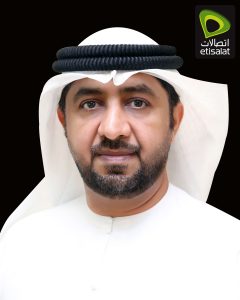
The telecom sector in the UAE has witnessed technological development over decades starting from the first telephone call in the 70s until the launch of the 5G network last year becoming the backbone for limitless connectivity for IoT and the fourth industrial revolution.
Etisalat on its part has continuously focused on innovation as part of its strategy to empower societies embedded within its DNA manifested across the business.
The beginning of the telecom revolution
In 1976, Etisalat began its journey on the formation of the UAE as the first national telecom provider and then launching the first mobile network. With technology evolution and as the needs of consumers evolved, in 1986, the first optic network was launched setting a path for next-generation services.
The year 1989 also witnessed the launch of the Etisalat University (now Khalifa University). This was in line with our overall digital vision and strategy that encouraged strategic learning in futuristic technologies and play an essential role in shaping the talent landscape and identifying the right skill for new technology.
The culture and collaboration within the organisation based on our core values have helped build future capabilities, skills bridging the gap between current and future digital requirements and accelerate digital learning expertise.
Transforming the network
With the beginning of the next decade, Etisalat has set global strides by diversifying its business, making a bigger impact with 5G technologies and laying the foundation for the next generation of technology.
This was all possible due to the solid groundwork by our predecessors in the 90s and leading the way in the regional and digital telecom sector. In 1994, Etisalat launched its first GSM network in the Middle East with the SMS service becoming a platform for various businesses and verticals to move away from traditional advertising platforms.
The 90s witnessed a revolution in the telecom sector, with Etisalat offering internet services for the first time in the region in 1995 and the first broadband internet service via ADSL technology in 1999. This laid the foundations for the future of digital services and solutions for generations to come.
With the launch of path-breaking services in the ’90s, there was no looking back, consumers for the first time experienced cable TV services, mobile data, MMS, and 3G.
The year 2000 witnessed the launch of the first cable TV services from e-vision and Etisalat Academy a provider for telecom and technology training. In 2002, Etisalat consumers experienced mobile data on a GPRS (General Packet Radio Service) network enabling data transfers through cellular networks giving them an opportunity to use it for mobile internet, MMS and other data communications. The foundation of an advanced futuristic network was laid during the early 2000s with High-Speed Downlink Packet Access (HSDPA) technology that provided high-speed internet services through mobile phones and mobile data cards. It was part of the 3G evolution for mobile networks that followed the GSM/UMTS track. This was also a method to provide high-speed downloads to users.
Fostering innovation and innovators of tomorrow was always integral to our overall company philosophy of supporting the youth in leading digital innovations. Etisalat University became Khalifa University in 2007 providing a platform for future technology innovators and entrepreneurs. This was followed by the launch of the high-speed internet service (HSPA+) in the year 2010 for the first time in MENA.
Leading the way as a telecom brand and operator
The year 2017 was significant with major successes in infrastructure and technology for Etisalat, it was the first time UAE was globally ranked as the widest FTTH network followed by the opening of a first of a kind ‘Open Innovation Center’ in Dubai and Etisalat being valued as the most valued telecom operator in the Middle East by Brand Finance. In the same year, we also enhanced our international connectivity to the UAE with AAE-1 submarine cable system.
Today Fiber to the Home (FTTH) has reached 95.7 percent across UAE, maintaining the UAE’s position as a global leader. This was only possible due the efforts in building and investing in the infrastructure over the decades. In 2011, the foundation of success on the network was laid with the implementation of 4G making Abu Dhabi the first capital fully covered with fiber optic.
This was followed by a series of achievements in 2013 with cloud computing services provided to SMEs, the first optic layer in 2016 connecting the region with fast internet providing IoT services and establishing an IoT centre.
Etisalat’s partnership and investments have also given it a lead among competitors and in the region. The strategic partnership with Microsoft to deliver the comprehensive and trusted cloud from their first data centre in the Middle East, Etisalat data centres acquiring PCI/DSS an international and global certification guaranteeing maximum safety of customer data at all times and for quality the prestigious TL9000 certification.
5G a reality for the next generation journey and achievements
5G is a reality today in UAE with Etisalat’s pioneering efforts in 5G to enable subscribers to enjoy and unleash highly connective technologies blending physical and digital realms from AR and VR to IoT, AI, autonomous vehicles, advanced robotics, 3D printing, wearable tech and more.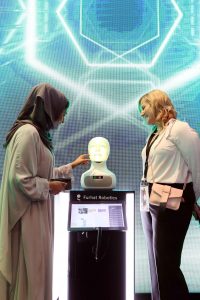
Our continuous investments and focus on enhancing and building one of the most advanced networks in the region have empowered digital transformation opening up opportunities to engage with our customers in new ways. Innovation was always at the core of our strategy and all our efforts on enabling connectivity based on speed and throughput, mobility, connected devices and IoT, energy efficiency, latency and reliability.
Etisalat embarked on its 5G journey in 2014 when it started construction of the network with a dedicated team of engineers and specialists to build one of the most advanced networks in the region.
In 2015, the first major 5G project was signed with Expo 2020 Dubai as part of the premier partnership with Etisalat Group to make it one of the fastest, smartest and best-connected places in the world during the global mega event.
In the same year, a number of strategic partnerships were signed with global technology companies to carry out trials and implement advanced technologies and solutions on the network. A series of tests were carried out in the infrastructure to gauge the extent of 5G readiness and get an insight into the upgrades required to launch the 5G network first in the region. The goal was to provide access to high data transfer speeds to get the network ready for data-heavy applications and content to be broadcasted across media platforms during the Expo 2020.
Another significant milestone in 2016 was the successful completion of the first live 5G experiment using millimeter waves (mmWave). This showcase was the first of its kind in the MENA region with Etisalat becoming the first telco globally to test speed at 36 Gbps on a 5G network. This was followed by another global milestone in 2017 with a speed showcase of 71Gbps setting a new global record in data transfer speed using e-band and massive MIMO technology.
Early in 2018, Etisalat set global benchmarks in 5G in technology and on the network. Etisalat successfully conducted a 5G trial with outdoor mobility. The trial demonstrated 5G capabilities in a real-world environment over a live network, including tests on speed, latency and beam steering. The 5G trial system used 800MHz of spectrum in the 15GHz band, demonstrated over 20 times greater performance than what was currently used in 4G networks. The trial also achieved an aggregate site throughput of more than 24Gbps a significant improvement over current 4G networks.
This was also the year Expo 2020 was announced as the first major commercial customer to be connected and access 5G services in MEASA region. This supports Expo 2020’s goal to be one of the most connected places on Earth, both physically and virtually.
Another major milestone for Etisalat and the telecom industry was the launch of the first commercial 5G wireless network in the UAE becoming the first telecom operator in the Middle East and North Africa (MENA) region to achieve this technological milestone and set an industry benchmark. Etisalat was the first operator to have a fully developed commercial 5G network available to provide gigabit internet services to its customers. The network will fuel enterprises digital transformation, IoT, smart cities and the fourth industrial revolution.
The foundation of this commercial launch was laid in 2017, where Etisalat was one of the operators to launch a pre-commercial 5G network in certain areas of the country demonstrating high-speed use cases in addition to the low latency of the 5G technology.
In the first phase of the 5G launch, fixed wireless services (fixed and internet services) was provided at selected locations in UAE, which was gradually expanded to other parts of the country depending on consumer demand and requirements. The commercial fixed devices and services were provided to consumers in this phase. Etisalat was aiming to achieve a download speed of 5Gbps for wireless access and more than 1.5Gbps for CPE (customer premises equipment) devices.
Etisalat Digital-Making digital aspirations a reality
The launch of Etisalat Digital was to actively contribute to the digital transformation market, which has a huge opportunity, especially in the UAE, for digital services. The government’s push for innovation makes UAE an incredible destination for everything digital. The combination of Etisalat’s vast experience in the field of connectivity with enhanced agility for digital innovation led to the formation of Etisalat Digital. The prime aim of the unit is to enable digital transformation of enterprise and government customers.
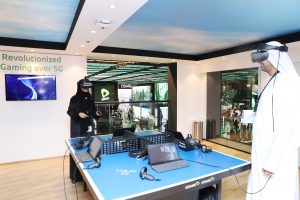 There are several important projects the department has worked on in digital health, security and smart cities. Dubai Expo 2020 is one of these projects that supports the UAE’s long-term strategy in becoming the most sought-after global destination for trade, business and development.
There are several important projects the department has worked on in digital health, security and smart cities. Dubai Expo 2020 is one of these projects that supports the UAE’s long-term strategy in becoming the most sought-after global destination for trade, business and development.
As the premier digital and telecommunications partner of Dubai Expo2020, we have delivered one of the fastest, smartest and best-connected places on earth during the global mega event. We have been involved in creating the infrastructure for the Expo site – enabling Expo 2020 Dubai to provide visitors and participants with a cutting edge, immersive digital experience that brings the Expo themes to life for the 25 million expected visitors.
Another project that has set a benchmark as one of the most successful projects in the entertainment space in the region is the delivery of the digital infrastructure for Dubai Parks and Resorts. This included digital channels, different smart services (such as smart parking, smart ticketing, connected transportation and connected food and beverage), in addition to other smart solutions around the park such as video surveillance-as-a-service, real time marketing and analytics.
Many of the other successful projects over the years included working on public transport projects with high-speed connectivity, remote health services for the first time in the private sector with American Hospital, enabling a series of digital initiatives to empower the region’s education sector with Alef Education and protecting the lives of the UAE citizens with Ministry of Interior to provide the smart fire alarm solution ‘Hassantuk’.
The bespoke solution for Federal Electricity and Water Authority (FEWA) hosted and powered by Etisalat’s UAE based OneCloud a fully managed application enabled the authority to connect with their customer more effectively.
Other integral projects in the banking sector include the launch of a digital invoicing solution for SMEs with First Abu Dhabi Bank (FAB) and the development of the UAE Trade Connect (UTC) platform along with eight banks safeguarding the banking industry from potential fraud losses through advanced detection tools, allowing them to extend additional financing to their corporate clients.
Etisalat Digital is also actively working on several interesting projects and has engaged with industry experts as well as acquired digital assets and platforms including data centres, cloud, digital and mobile payment, Internet of Things, big data and analytics engines. By providing platforms to its customers, Etisalat Digital enables businesses to get access to several technologies through a service model, instead of having to invest in the whole platform.
Etisalat Digital brings its unique value by combining the scale, strength and robust network with the agility, skills and platforms of a digital player. The business unit has access to global skills and expertise, state-of-the-art digital assets such as data centers, cloud, cybersecurity, M2M and Internet of Things (IoT) platforms, analytics, big data engines and digital payment gateways. This is in addition to 24×7 Cloud, Security and IoT Command and Control Centers in Abu Dhabi and Dubai for fully managed solutions and proactive monitoring.
One of the key objectives of the business unit Etisalat Digital is giving young companies a platform to engage with our experts, have access to our robust network and utilise our digital technologies to build viable products and new revenue streams. Etisalat Digital’s partnership with Dubai Future Accelerators, the world’s largest government-supported accelerator, pair’s top start-ups with the Dubai government entities allowing them to build, test and deploy solutions for 21st-century challenges.
Etisalat joined the programme in its second round and have launched several challenges focusing on futuristic technologies like AI and robotics. Selected start-ups get the chance to be on board in the Etisalat Scaleups program where they were given access to Etisalat Digital resources and experts, office space, and support to deliver pilot projects to effectively demonstrate the value and potential of the partnership and technology.
Another significant project for Etisalat Digital was the two-year Scale Abu Dhabi (AD) programme with Abu Dhabi Digital Authority (ADDA) to help drive the emirate’s digital transformation. Over this period, a design-led methodology and process will be empowered by the Etisalat Digital co-creation lab to develop innovative solutions as well as a hub to source global innovation to the emirate of Abu Dhabi. It will also enable ADDA with access to cutting-edge technology platforms such as IoT, blockchain, big data, video analytics and cloud. A co-branded space will be provided for ADDA to become a leading hub of innovation and creativity in the region.
With nurturing innovation as one of the key goals for Etisalat Digital, it introduced its own programme called ‘Future Now’ to collaborate with startups, IoT developers, government entities, enterprises, and their end-users. Future Now has four key pillars: Scale-ups program, a Co-creation Lab, an IoT partner ecosystem and an Innovation Center.

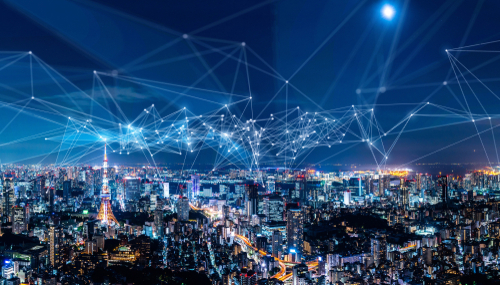

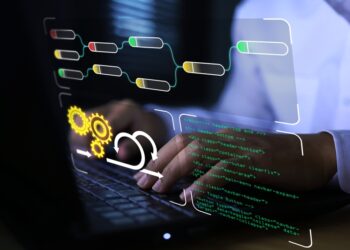






Discussion about this post